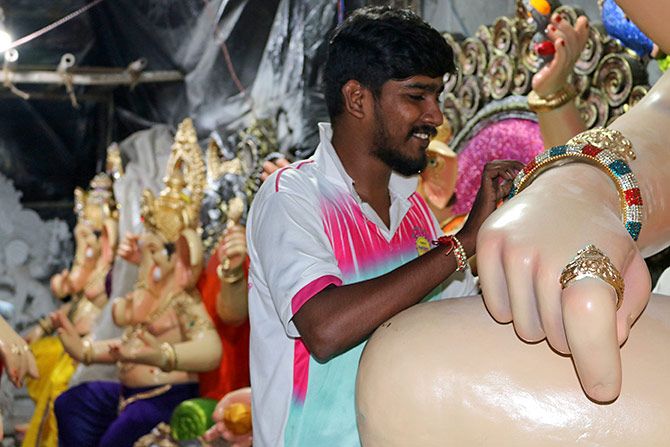Meet the people who labour into the night to create idols of the God of Auspicious Beginnings.
Text: Anita Aikara/Rediff.com; Photographs: Satish Bodas/Rediff.com
ALSO SEE: Mumbai gets ready to welcome Lord Ganesha

A walk down the bylanes of Mumbai's old Lalbaug area just before Ganesh Chaturthi lets you glimpse the life of the artisans who have been creating Ganesha idols for years now.
A week prior to the festival, which begins on September 13, the narrow lanes here are jammed with vehicles.
Everyone is in a hurry to pick up their idols and head home.
While some live close by, others have come from the neighbouring Thane and even cities like Nashik, Nagpur and Pune.
In the months leading to Ganesh Utsav, there is an added charm to these lanes as the idols take shape.
The streets here are interspersed with workshops situated just a stone's throw away from each other.
Tall buildings jostle with humble chawls that may soon become forgotten nuggets of history.

The workshops are made of simple, temporary bamboo structures.
People from different age groups come together to create stunning idols.
A flickering fluorescent lamp is the only source of light post sunset and the gust of air that sweeps in through the black plastic sheets meant to protect the structure from rain and sun offer some respite from the morning heat.

There are no designated roles in these workshops. "Everyone is a friend who comes to help," says Kiran Adsul, 29, whose family has been making idols for 22 years.
"We don't tell people what has to be done. Each person has a unique gift and everyone is happy to help.
"We intervene just in case someone needs guidance."
An event manager by profession, Kiran runs his own business. "That's why I have no issues taking a break to help out with the idols," he says.
Kiran explains, "Extremely tall idols are transported earlier to the pandals to avoid any damage. The tall idols are mostly meant for show. They are usually accompanied by smaller idols that are worshipped."

At Kiran's workshop, a 11-feet idol usually takes around 4-5 days to create.
"Two days are dedicated to getting the structure ready," he explains.
Sixty idols of various sizes are created in his workshop. The smallest idol is an inch tall; the tallest can go up to 19 feet.
"Completing the idols, from start to finish, takes 2-3 months. But the planning begins well in advance," says Kiran.
"We create the idols based on the demand. Some people ask for ornate idols, others opt for minimalistic ones."

Kiran is just one of the many people who squeeze time out of their day jobs to volunteer at these idol-making workshops.
The process usually begins by creating the mould.
Then the idol is given the right finish and white-washed.
After it is painted in a skin colour, the shalu, dhoti (clothes) and jewellery are painted on.
Many workshops have started using fabrics to create the dhoti and shalu.

Almost every tall idol is made of plaster of paris. Clay or mitthi (as they call it) is reserved for the smaller idols.
"Clay is very delicate. We need to be extremely careful while making such idols. If we accidentally brush against the idols, it cracks," says Kiran who'd like to go eco-friendly. "If more people opt for smaller Ganpatis, then that will be a reality."

For most artisans, drawing the eyes of Lord Ganesha is the most challenging part.
Ratnakar Madhusudan Kambli of Kambli Arts says, "The eyes must look as real as possible. From every angle, it must feel as though Lord Ganpati is looking back at you.
"But what's tough is that both the eyes should look the same.
"When painting big idols, we actually need to climb down every time to check if we're doing the eyes right since we can't see the left eye while painting the right one and vice versa."

With each workshop churning out 100 to 200 idols during Ganesh Chaturthi, family and friends join in the idol-making process every June.
During those months, most people straddle two professions, which means that they end up working through the night, post their office hours, and sleeping for just 3-4 hours during the last few weeks.
"We don't come here for the money or profit," says artist Anil Samant. "We are here for the sheer joy we get helping our families and friends. We do the work and receive God's blessings."

"We start working on the idols from June," says Rawle Bandhu, whose family has been making idols for the last 99 years.
"First, the basic structure is made with clay or plaster of paris. That usually takes 2-3 days."
Most of Rawle's Ganpatis are headed to Nagpur this year.
"This year, there's a lot of demand of idols inspired by Lord Shiva," says the sculptor, who first took on the responsibility of making idols after his 12th standard exams.
His brother occupies the workshop next door. "He specialises in taller idols," says Rawle.

Come September 13, all these workshops will be empty.
The buzz that begins here during this popular festival will disappear, until Lord Ganesha visits us again next year.
Dear readers, how are you celebrating the festival?
Are you bringing home a Ganesha? Have you decorated your home yet?
Do you have a theme every year?
Will you go pandal hopping with friends and family?
Send us photographs of your favourite Ganeshas and the celebrations.
You can e-mail them on getahead@rediff.co.in (Ganesha Pix) or upload them here #Ganesha-Pics along with your NAME, LOCATION and details of the Ganesha and celebrations.
We will carry the best ones right here on Rediff.com.











